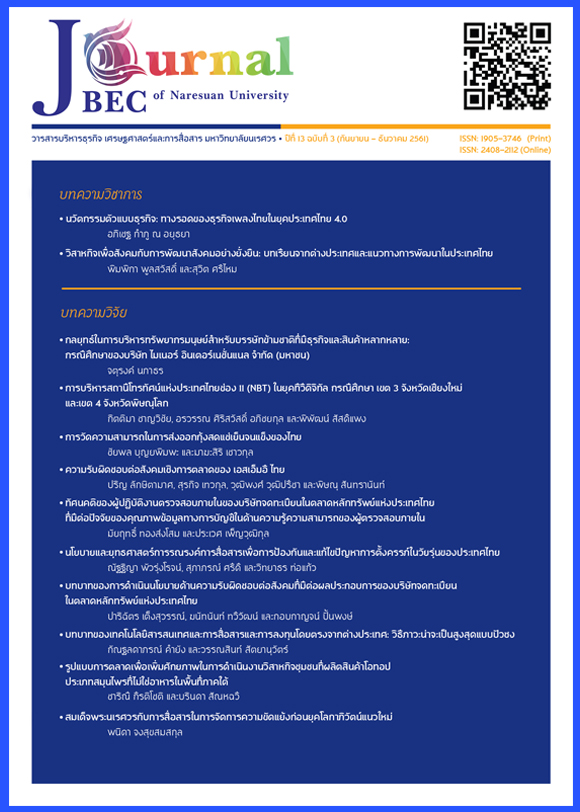The Role of Corporate Social Responsibility Policies’ Implementation on Performance of Listed Companies in the Stock Exchange of Thailand
Main Article Content
Abstract
This research aims to study corporate social responsibility activities, evaluate and compare the performance of corporate social responsibility businesses enterprises to other business enterprises. The data of the listed companies on the Stock Exchange of Thailand with a top 100 market value in 2014 were analyzed using Data Envelopment Analysis (DEA) to determined corporate performance in terms of profitability and marketability performance. The research found that when dividing listed enterprises on the Stock Exchange of Thailand with a first top 100 market value (SET100 Index) by its CSR activities and the preparation of sustainability reports in 2014. The result divides 43 companies with the corporate social responsibility and 57 companies were other business enterprises. An analysis of businesses performance found that the business enterprises with social responsibility have more profitability performance and marketability performance than other business enterprises.
Article Details
References
2. Banker, R. D., Charnes, A. and Cooper, W. W. (1984). Some models for the estimation of technical and scale inefficiencies in data envelopment analysis. Management Science, 30(9), 1078-1092.
3. Charnes, A., Cooper, W. W. and Rhodes, E. (1978). Measuring the efficiency of decision making units. European Journal of Operational Research, 2(6), 429-444.
4. Cheewarunotai, W. (2010). The power of CSR to excellence organization advance edition. Bangkok, Thailand: Thanprinting.
5. Corporate Social Responsibility Institute. (2008). Business compass for social. Bangkok: Icon Printing.
6. Elhauge, E. (2005). Sacrificing corporate profits in the public interest. New York University Law Review, 80(3), 733-869.
7. Farrell, M. J. (1957). The measurement of productive efficiency. Journal of the Royal Statistical Society. Series A (General), 120(3), 253-290.
8. Friedman, M. (1970). The social responsibility of business is to increase its profits. New York Times Magazine, 122-124.
9. Kotler, P. and Lee, N. (2005). Corporate social responsibility. New Jersey: John Wiley & Sons.
10. Krongkaew, M. (2009). How do economists view for the corporate social responsibility?. In Moral Lead Business. Bangkok: Office of the National Anti-Corruption Commission.
11. Naphavaranonth, P. (2008). CSR: Business social and sustainability. BOI e-Journal, 19(6), 39-42.
12. Odthon, P. (2009). Technical efficiency measurement through Data Envelopment Analysis (DEA): A case study of asset management companies. Ramkhamhaeng University Journal, 26(Special), 337-350.
13. Patmasiriwat, D. (2009). Efficiency of the medium-sized community hospitals in Thailand: The case study of 166 community hospitals under the Ministry of Public Health. NIDA Development Journal, 49(1), 79-104.
14. Sakboonyamal, P. and Homsombat, W. (2016). The sustainability of listed companies moving from market for alternative investment to the stock exchange of Thailand. Journal of Business, Economics and Communications, 11(1), 56-68.
15. Lo, S. (2010). Performance evaluation for sustainable business: A profitability and marketability framework. Corporate Social Responsibility and Environment Management, 17(6), 311-319.
16. Suwankesorn, S. (2009). Efficiency evaluation of the general – hospitals under the Ministry of Public Health with Data Envelopment Analysis technique. Thaksin University Journal, 12(3), 234-244.
17. Thaipat Institute. (2010). Type of CSR activities. Retrieved November 9, 2010, from https://www.thaicsr.com/2008/01/blog-post_07.html
18. Untong, A. (2004). Manual for using DEAP 2.1 program for efficiency analysis by Data Envelopment Analysis method. Chiang Mai: Social Research Institute Chiang Mai University.
19. Yampracha, C. and Tor-Sriwong, B. (2009). Review of Corporate Social Responsibility (CSR) and case of CSR activity in pharmaceutical business. The Thai Bulletin of Pharmaceutical Sciences, 4(3), 97-120.


